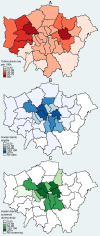Effectiveness of peer educators on the uptake of mobile X-ray tuberculosis screening at homeless hostels: a cluster randomised controlled trial
- PMID: 26391630
- PMCID: PMC4577934
- DOI: 10.1136/bmjopen-2015-008050
Effectiveness of peer educators on the uptake of mobile X-ray tuberculosis screening at homeless hostels: a cluster randomised controlled trial
Abstract
Trial design: Cluster randomised controlled trial.
Objective: To compare current practice for encouraging homeless people to be screened for tuberculosis on a mobile digital X-ray unit in London, UK, with the additional use of volunteer peer educators who have direct experience of tuberculosis, homelessness or both.
Participants: 46 hostels took part in the study, with a total of 2342 residents eligible for screening. The study took place between February 2012 and October 2013 at homeless hostels in London, UK.
Intervention: At intervention sites, volunteer peer educators agreed to a work plan that involved moving around the hostel in conjunction with the hostel staff, and speaking to residents in order to encourage them to attend the screening.
Randomisation: Cluster randomisation (by hostel) was performed using an internet-based service to ensure allocation concealment, with minimisation by hostel size and historical screening uptake.
Blinding: Only the study statistician was blinded to the allocation of intervention or control arms.
Primary outcome: The primary outcome was the number of eligible clients at a hostel venue screened for active pulmonary tuberculosis by the mobile X-ray unit.
Results: A total of 59 hostels were considered for eligibility and 46 were randomised. Control sites had a total of 1192 residents, with a median uptake of 45% (IQR 33-55). Intervention sites had 1150 eligible residents with a median uptake of 40% (IQR 25-61). Using Poisson regression to account for the clustered study design, hostel size and historical screening levels, there was no evidence that peer educators increased uptake (adjusted risk ratio 0.98; 95% CIs 0.80 to 1.20). The study team noted no adverse events.
Conclusions: This study found no evidence that volunteer peer educators increased client uptake of mobile X-ray unit screening for tuberculosis. Further qualitative work should be undertaken to explore the possible ancillary benefits to peer volunteers.
Trial registration number: ISRCTN17270334.
Published by the BMJ Publishing Group Limited. For permission to use (where not already granted under a licence) please go to http://group.bmj.com/group/rights-licensing/permissions.
Figures
References
-
- Agency HP. Tuberculosis in the UK: 2013 report. http://www.hpa.org.uk/webw/HPAweb&HPAwebStandard/HPAweb_C/1317139689732 (accessed 9 Apr 2014).
-
- De Vries G, Aldridge RW, Cayla JA et al. . Epidemiology of tuberculosis in big cities of the European Union and European Economic Area countries. Euro Surveill 2014;19:pii: 20726. - PubMed
Publication types
MeSH terms
Associated data
Grants and funding
LinkOut - more resources
Full Text Sources
Other Literature Sources
Medical


